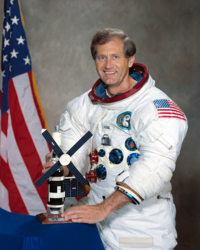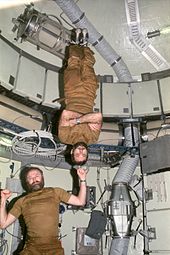William R. Pogue
| William Pogue | |
|---|---|

|
|
| Country: |
|
| Organization: |
|
| selected on | April 4, 1966 ( 5th NASA Group ) |
| Calls: | 1 space flight |
| Begin: | November 16, 1973 |
| Landing: | February 8, 1974 |
| Time in space: | 84d 1h 15m |
| EVA inserts: | 2 |
| EVA total duration: | 13h 34m |
| retired on | 1st September 1975 |
| Space flights | |
|
|
William Reid Pogue (born January 23, 1930 in Okemah , Oklahoma , † March 3, 2014 in Cocoa Beach , Florida ) was an American astronaut .
Education and military career
William Pogue earned a bachelor's degree in education from Oklahoma Baptist University in 1951 and a master's degree in mathematics from Oklahoma State University in 1960 . In 1974 he received an honorary doctorate from Oklahoma Baptist University.
Pogue joined the United States Air Force in 1952 . After serving in the Korean War , he worked as a pilot trainer at Edwards Air Force Base . From 1960 to 1963 he taught mathematics at the US Air Force Academy in Colorado Springs . He then spent two years as a test pilot in an exchange program between the US Air Force and the British Royal Air Force .
Astronaut activity
Pogue was one of 19 astronauts selected by NASA for the Apollo program in April 1966 . He was used in the support teams for the crews of the Apollo 7 , 11 and 14 missions. Pogue would have had a chance to fly into space as the pilot of the command module on a late Apollo mission, possibly with Apollo 19 . This flight was canceled in September 1970, long before the crew was officially announced. Pogue was assigned to the Skylab program.
On November 16, 1973 Pogue started as a pilot of the Skylab-4 mission on the third and final manned flight to the Skylab space station. On what was the longest space flight to date, he was accompanied by Commander Gerald P. Carr and the science pilot Edward Gibson . They carried out numerous experiments and extensive earth and solar observations. With two space exits, Pogue spent a total of over 13.5 hours outside the space station. After 84 days, Skylab 4 landed on Earth again on February 8, 1974. The record set by Pogue and his teammates lasted four years. On his space flight Pogue was no official order as the first Automatic - chronograph in space a Seiko Cal. 6139 with yellow dial, which has since been named after Pogue, so-called “ Pogue Seiko ” (see picture on the right).
After retiring from NASA and the Air Force on September 1, 1975, Pogue was an aerospace consultant and producer of films about space travel.
Writing career
In 1991 Pogue wrote the book How do you go to the Bathroom in Space? (How do you go to the bathroom in space?) In which he answers 270 questions he has been asked frequently. He was also co-author of the science ficton novel The Trikon Deception with Ben Bova in 1992 .
Honors
Pogue received the NASA Distinguished Service Medal in 1974 and was inducted into the Astronaut Hall of Fame in 1997 . The city of Sand Springs , Oklahoma, renamed its airport in 1975 to William R. Pogue Municipal Airport .
Private
Pogue was descended from the Choctaw Indian tribe . He was married three times and had three children from his first marriage and four stepchildren from his second marriage. Pogue died at his Florida home on March 3, 2014, aged 84.
See also
Web links
- Short biography of William R. Pogue at spacefacts.de
- NASA biography of William R. Pogue (English; PDF)
- Biography of William R. Pogue in the Encyclopedia Astronautica (English)
- Obituary at Collectspace: Skylab astronaut William Pogue dies at 84 (English)
Individual evidence
- ^ Sara Paulson: Former Skylab pilot dies at 84. floridatoday.com, accessed March 6, 2014 .
- ↑ a b William Pogue's Seiko 6139 Watch Flown on Board the Skylab 4 Mission, from his Personal Collection ... The First Automatic Chronograph to be Worn in Space. , accessed June 22, 2014
- ↑ The “Colonel Pogue” Seiko 6139 , dreamchrono.com, accessed February 23, 2015.
- ^ Sand Springs. In: Encyclopedia of Oklahoma History & Culture. Oklahoma Historical Society, August 25, 2010, accessed March 5, 2014 : "Sand Springs opened its municipal airport in May 1971. The name was changed in 1975 to William R. Pogue Airport to honor the Skylab 4 astronaut."
- ↑ Tim Stanley: Sand Springs native, Skylab astronaut Bill Pogue dies at 84th Tulsa World, March 4, 2014, accessed March 5, 2014 .
| personal data | |
|---|---|
| SURNAME | Pogue, William R. |
| ALTERNATIVE NAMES | Pogue, William Reid |
| BRIEF DESCRIPTION | American astronaut |
| DATE OF BIRTH | January 23, 1930 |
| PLACE OF BIRTH | Okemah , Oklahoma |
| DATE OF DEATH | March 3, 2014 |
| Place of death | Cocoa Beach , Florida |


